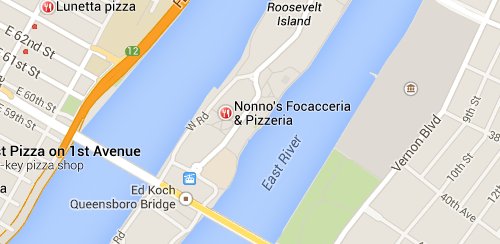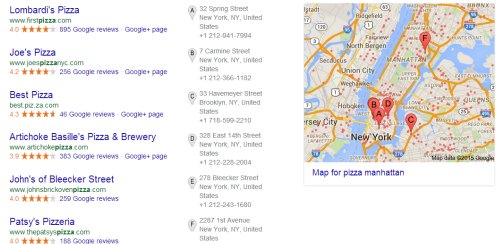
What Are Local Search Results?
Searches that have a localized element are usually placed above other search results, but still below any relevant ads that may be shown. When looking at local search results, several differences between these results and "normal" search results will be apparent:
- Local search results are accompanied by a map on the right, displaying the exact location of each search result
- Each local search result has an address listed next to it
- Each local search result has a link to their Google+ page
- Each local search result is accompanied by a star rating or the number of reviews, if applicable

As with it's normal search results, Google wants it's local search results to be as useful as possible. Searches with a localized element generally mean that the person searching for something wants to be able to pick something up or visit somewhere local to them, and Google therefore give precedence to local businesses. Consider the motivation behind the following example searches that return local search results above other results:
- "pizza Manhattan"
- "accountants Newbury"
- "coffee shop" (via a smartphone set to allow Google to detect your location)
In these examples, it is clear that the person searching is looking for local search results, and are going to be less interested in results for pizza parlors, accountants or coffee shops hundreds of miles away.
What Is Local SEO?
Even if you're not sure how it works, you will have heard of the term SEO, which encompasses all the methods used to ensure that your website ranks as highly as possible in search engines for specific search terms. SEO normally focuses on how highly your website ranks for these search term when anyone searches for them, both in your country's search results (e.g. in google.co.uk) and internationally (e.g. in google.com). Local SEO applies specifically to searches that have a localized nature, for example "pizza in maidenhead".
The information shown for each local search result is taken directly from that business's Google+ Local page. Local SEO therefore differs from conventional SEO in that it requires you to have a Google+ Local page for your business, and in that you need to optimize both your website and your Google+ Local page.
What Are The Benefits of Local SEO?
Local SEO is the best marketing method for small businesses that want to attract local customers, but have a limited budget or limited resources. Here's why:
- Fast Results: Traditional SEO campaigns and social media marketing can take many months or even years to become fruitful. Local SEO can yield results for your business in just weeks.
- It's Free: It's completely free to set up and maintain everything involved in Local SEO. Even if you pay a third party to do this for you, it's much more affordable than an effective SEO campaign or social media marketing.
- Low Competition: Many small businesses are yet to embrace Local SEO. This means that quick action on your part will lead to high rankings for local searches and more customers. Using Local SEO, it's even relatively easy to be ranked first in Google's search results for some local searches.
- It's Simple: Setting up and maintaining everything involved in local SEO is not difficult and not too time consuming. This is reflected in the relatively low cost of Local SEO if you pay a third party to do it for you.
- Your Website Is Not (Too) Important: Unlike with traditional SEO, you don't have to have an amazing website that has been optimized for search engines. This means that even if you are not happy with your website, or are planning upgrades, now is still the time to invest in Local SEO.
Is Local SEO Right For My Business?
There are two key factors in deciding whether it is worth investing in Local SEO for your business:
- Your business needs to have a physical location for potential customers to visit. Many businesses now operate completely online and, as we have seen, these would not offer the best results for searches with a localized element.
- Google only shows Google+ Local business pages in search results for some search terms in some localities. If this is the case for searches in your area for search terms relevant to your business, then you should be investing in Local SEO.
If your business has a physical location and Google shows local search results for your type of business in your area, you can almost immediately start attracting new customers to your business by engaging in Local SEO. One thing you can be sure of is that for every week that you are not actively engaging in Local SEO, you will be losing customers to your competitors.


